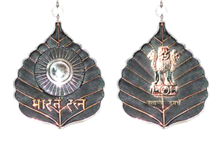
Back بهارات راتنا Arabic بهارات راتنا ARZ ভাৰত ৰত্ন Assamese भारत रत्न Bihari ভারতরত্ন Bengali/Bangla Bharat Ratna Czech Bharat Ratna German Premio Bharat Ratna Spanish Bharat Ratna saria Basque بهارات راتنا Persian
| Bharat Ratna | |
|---|---|
 | |
| Type | National civilian |
| Description | Highest Civilian Award of the Republic of India |
| Country | |
| Presented by | |
| Ribbon | |
| Obverse | An image of the Sun along with the words "Bharat Ratna", inscribed in Devanagari script, on a peepal (Ficus religiosa) leaf |
| Reverse | A platinum State Emblem of India placed in the centre with the national motto, "Satyameva Jayate" (Truth alone triumphs) in Devanagari script |
| Established | 1954 |
| First awarded | 1954 |
| Last awarded | 2024 |
| Total | 53 |
| Precedence | |
| Next (lower) | |
The Bharat Ratna (Hindi pronunciation: [bʰaːɾət̪ rət̪nə]; Jewel of India) is the highest civilian award of the Republic of India. Instituted on 2 January 1954, the award is conferred in recognition of "exceptional service/performance of the highest order", without distinction of race, occupation, position or gender. The award was originally limited to achievements in the arts, literature, science, and public services, but the Government of India expanded the criteria to include "any field of human endeavor" in December 2011. The recommendations for the award are made by the Prime Minister to the President. The recipients receive a Sanad (certificate) signed by the President and a peepal leaf-shaped medallion with no monetary grant associated with the award. Bharat Ratna recipients rank seventh in the Indian order of precedence.
The first recipients of the Bharat Ratna were: the former Governor-General of the Union of India C. Rajagopalachari, the former President of the Republic of India Sarvepalli Radhakrishnan; and the Indian physicist C. V. Raman, who were honoured in 1954. Since then, the award has been bestowed upon 53 individuals, including 18 who were awarded posthumously. The original statutes did not provide for posthumous awards but were amended in January 1966 to permit them to honor former Prime Minister Lal Bahadur Shastri, the first individual to be honored posthumously. In 2014, cricketer Sachin Tendulkar, then aged 40, became the youngest recipient, while social reformer Dhondo Keshav Karve was the oldest recipient when he was awarded on his 100th birthday. Though usually conferred on India-born citizens, the award has been conferred on one naturalized citizen, Mother Teresa, and on two non-Indians: Abdul Ghaffar Khan (born in British India and later a citizen of Pakistan) and Nelson Mandela, a citizen of South Africa.
The Bharat Ratna, along with other personal civil honours, was briefly suspended from July 1977 to January 1980, during the change in the national government; and for a second time from August 1992 to December 1995, when several public-interest litigations challenged the constitutional validity of the awards. In 1992, the government's decision to confer the award posthumously on Subhas Chandra Bose was opposed by those who had refused to accept the fact of his death, including some members of his extended family. Following a 1997 Supreme Court decision, the press communique announcing Bose's award was cancelled; it is the only time when the award was announced but not conferred.
© MMXXIII Rich X Search. We shall prevail. All rights reserved. Rich X Search